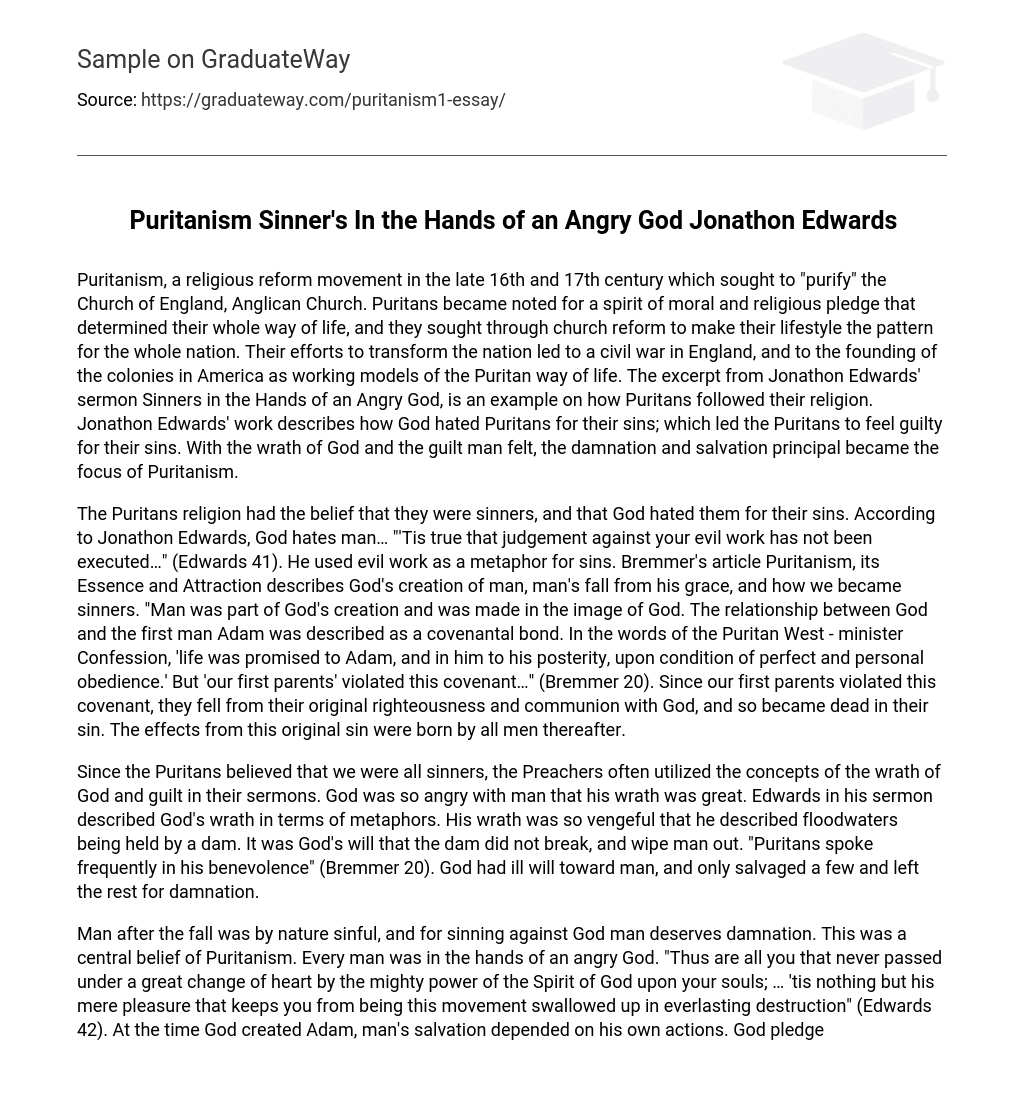The emergence of Puritanism in the late 16th and 17th century was a movement aimed at purifying the Anglican Church. The Puritans were renowned for their unwavering dedication to moral and religious principles, which influenced every aspect of their lives. Their objective was to reform the church in order to establish their way of life as the national standard. These endeavors led to a civil war in England, while also giving rise to Puritan colonies in America that served as models of the Puritan lifestyle. In his sermon “Sinners in the Hands of an Angry God,” Jonathan Edwards illustrates the profound devotion with which they practiced their faith. Edwards underscores God’s displeasure towards Puritans due to their transgressions and resulting guilt, thereby highlighting damnation and salvation as core tenets of Puritan beliefs.
The Puritans believed that they were sinners and that God hated them because of their sins. Jonathon Edwards explained that God dislikes humanity, referring to their “evil work” as a metaphor for sins (Edwards 41). In his article “Puritanism, its Essence and Attraction,” Bremmer discusses God’s creation of man, the fall from grace, and how humans became sinners. According to Bremmer (20), man was created by God in His image and had a covenantal bond with Him through Adam. However, our first parents violated this covenant, resulting in the loss of original righteousness and communion with God. As a result, all subsequent generations inherited the effects of this original sin.
The Puritans believed in the inherent sinfulness of all people, which led Preachers to frequently emphasize God’s anger and our guilt in their sermons. They described God’s wrath as immense, comparing it to floodwaters held back by a dam. The Puritans also spoke of God’s benevolence, but acknowledged that he harbored ill will towards humanity and only chose to save a few while condemning the rest.
The central belief of Puritanism was that humanity, corrupted by sin after the fall, inherently deserved damnation for transgressions against God. According to Puritan beliefs, every person was subject to the control of an angry God. Jonathan Edwards emphasizes this perspective stating, “Thus, if you have never experienced a profound transformation of the heart by the mighty power of the Spirit of God upon your soul…it is only by God’s pleasure that you are not consumed by eternal destruction” (Edwards 42).
In earlier times when Adam was created, human salvation relied on one’s own actions. In exchange for complete obedience to God’s will, Adam received promises of happiness from Him. This concept is exemplified in Puritanism through the Covenant of Works. However, due to mankind’s fallibility and subsequent breach of this covenant, their opportunity for salvation vanished. The consequences resulting from man’s sins could only be reversed through divine intervention. God presented redemption through the Covenant of Redemption which Bremmer defines as “the agreement made by the Father with the Son to provide salvation for some men and women through Christ’s sacrifice” (Bremmer 21).
Within this framework came individual redemption achievable through participation in the Covenant of Grace. Once an individual entered into this covenant and held faith in God, they could attain redemption.
In his sermon “Sinners in the Hands of an Angry God,” Jonathon Edwards primarily discussed Puritanism theology. He spoke about the sinful nature of man and God’s strong dislike for sinners, emphasizing the wrath of God. Edwards also focused on the condemnation of mankind, the steps involved in salvation and redemption. He used guilt and fear to drive his congregation towards repentance. Therefore, Edwards’ sermon encompassed the three covenants: Covenant of Works, Covenant of Redemption, and Covenant of Grace.





